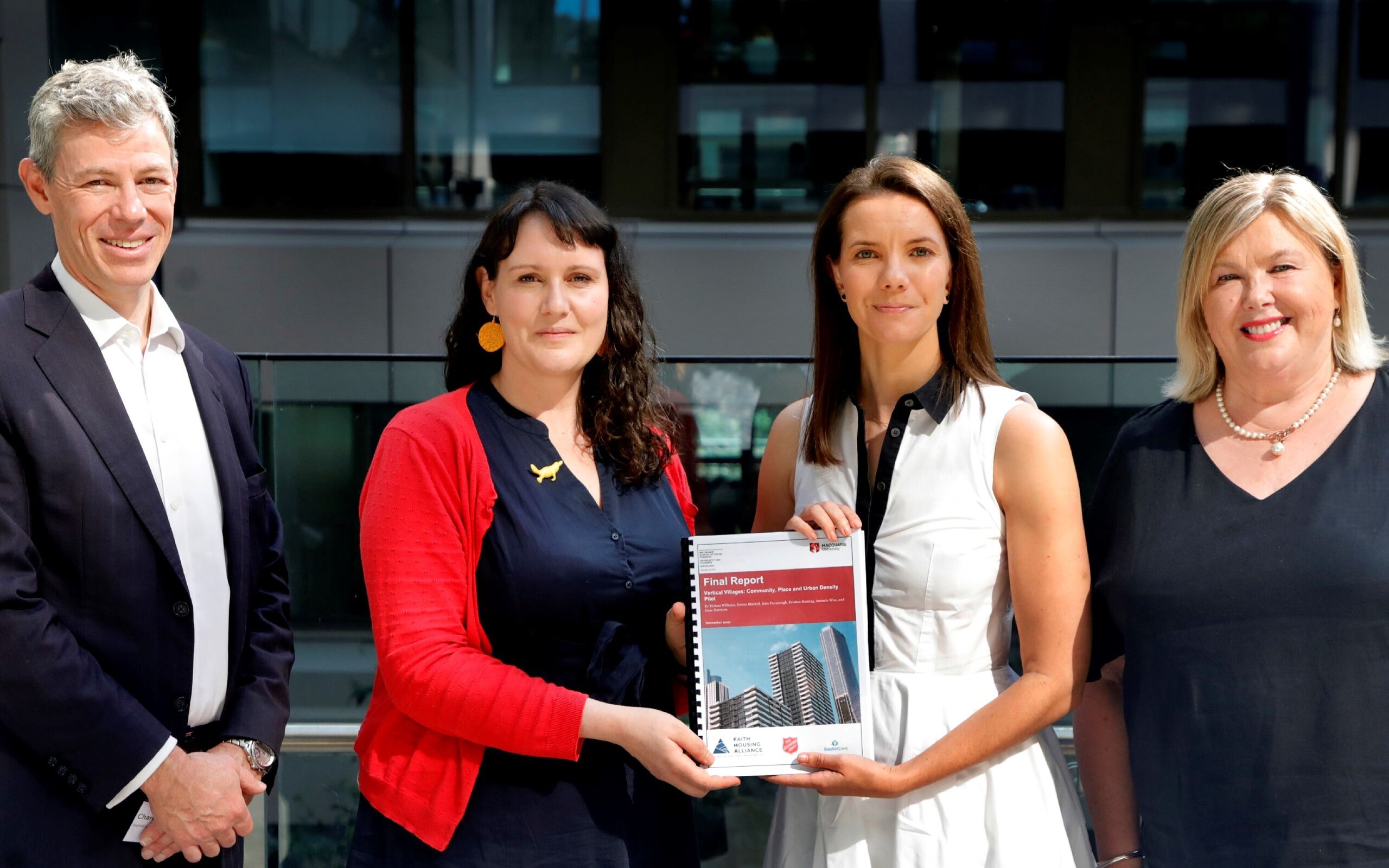Designing for a stronger community and healthier city with vertical villages
A new research report seeking to answer the question ‘How do we create socially connected communities in high rise developments which enhance community wellbeing?’ was launched on Monday 4 April by the Hon. Rose Jackson MLC, Shadow Minister for Water, Housing and Homelessness.
Scroll to Explore

05 April 2022
News
| Community Housing
A new research report seeking to answer the question ‘How do we create socially connected communities in high rise developments which enhance community wellbeing?’ was launched on Monday 4 April by the Hon. Rose Jackson MLC, Shadow Minister for Water, Housing and Homelessness.
Vertical Villages: Community, Place and Urban Density Pilot, a report developed in partnership with Macquarie University, Faith Housing Alliance (supported by a grant from the Salvation Army) and aged care and community housing provider BaptistCare, outlines key considerations and improvements to resident experiences that will help to promote overall wellbeing and community connection in cities.
The report calls for urban designers and place makers, architects, planners, developers, State Government, and council bodies to re-examine the way they build high-rise dwellings to enhance resident wellbeing.
Shadow Minister Ms Jackson said it is well known that NSW is facing a housing crisis, and more needs to be done to facilitate not just bricks and mortar for those in need, but also a sense of community.
“Sydney is one of the least affordable cities to live in globally, and regional NSW has seen staggering increases in house and rental prices in recent years. Political leaders have an obligation to deal with these issues with urgency, and to engage with non-government organisations and community groups who are actively proposing creative solutions,” said Ms Jackson.
“We know that housing is about more than just bricks and mortar – it’s about a home, a community where people feel safe, comfortable and welcome. This report is an essential part of that story, providing research to demonstrate the importance of investment in building not just houses, but communities and housing designed for connection and well-being.
Report author and lead researcher on the project from the Macquarie University School of Social Sciences, Faculty of Arts, Dr Miriam Williams, said that with 1 in 10 people living in apartments and the increasing densification of major cities, it is important to continually re-assess and evaluate the best ways to design high-rise with community connection in mind.
“It’s no surprise that many people living in cities feel a sense of isolation. Our study has been further proof of this point,” Dr Williams said.
“The Vertical Villages Report aims to encourage governments and developers to see high rise apartment developments as more than transitional forms of housing and continue to promote design principles that support residents to live well in high rises. We need to invest in building smarter, healthier, and attractive vertical villages with sufficient green space and social infrastructure provided to enhance community wellbeing and as an affordable solution for the long-term.
BaptistCare CEO, Charles Moore, shared the experience of BaptistCare as a housing provider at the event, saying the organisation’s community housing is about more than just putting a roof over a person or family’s head.
“We look to create safe and connected communities, where our support staff and onsite managers understand the hopes, dreams and goals of our tenants, and our tenants support each other. Design plays an important role in helping us achieve these goals,” he said.
“With the benefit of research like this we are able to plan and build genuine communities that enable people to meet new friends and form relationships, which ultimately improves their wellbeing through increased support and connection amongst neighbours.”
The Vertical Villages Report has compiled the findings of this study, which involved an online questionnaire, 25 semi-structured interviews with residents of high-rise apartments across five suburbs of Sydney, and 16 interviews with expert urban designers, place makers, and community developers offering insights from their experience and practice.
Faith Housing Alliance Chief Executive Officer, Rose Thomson said that the collaboration on this Report is an important step to facilitating stronger connections between urban planners and the role of community housing organisations when it comes to social and affordable housing development.
“These efforts must be supported by an inter-departmental approach by State Government, appropriate funding and a national housing plan, as our nation’s housing crisis continues to escalate,” Ms Thomson said.
The full report can be downloaded here.